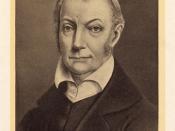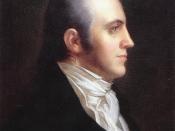In the months between and including May and September, in 1807, Aaron Burr was tried by the Supreme Court in Virginia on the count of treason against the United States. During the period of 1804 to 1807, Burr allegedly committed several overt acts, which are actions, that may be innocent in themselves, but in combination with the intentions and results of that act, become criminal actions. The trial was about treason, which the Constitution defines as "levying war against [the United States], or in adhering to their enemies, giving them aid or comfort," (Art. III, Sect. 3) and the prosecution must prove that Burr committed the overt act with the testimony of two witnesses, for the treason conviction to stand. In this trial, Burr's actions outside of the state of Virginia have no bearing on the overt act of assembling troops to levy war against the United States, and therefore the majority of his admissible actions occurred on Blennerhasset's Island in Virginia.
(Doc 108) Although the prosecution made a strong case for Burr's guilt, the differentiation between his intentions and his actions, his background as an American patriot and the lack of concrete evidence, one must conclude that Aaron Burr is not guilty of treason. He perhaps was even the victim of a larger governmental conspiracy to rid him of all prestige, honor and legacy.
The prosecution tried to prove that Burr used his power to assemble an army of men to conquer New Orleans, then Mexico and eventually found a new nation composed of the Western American states and Mexico. The fault in their argument is that his actions do not necessarily point directly towards this conclusion. It is true that Burr wrote letters and even discussed a new war with Spain and the formation of a new nation,


